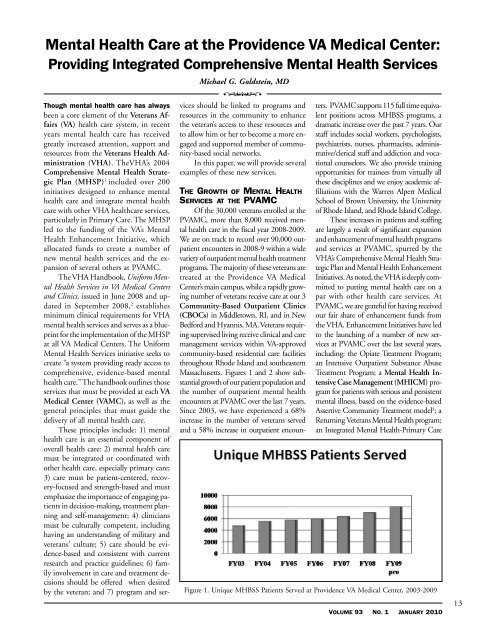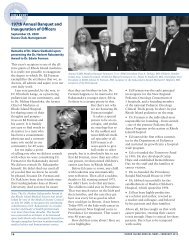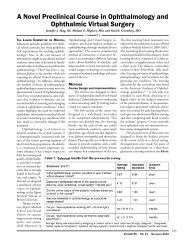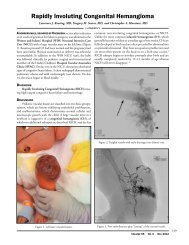Mental Health Care at the Providence VA Medical Center: Providing ...
Mental Health Care at the Providence VA Medical Center: Providing ...
Mental Health Care at the Providence VA Medical Center: Providing ...
Create successful ePaper yourself
Turn your PDF publications into a flip-book with our unique Google optimized e-Paper software.
<strong>Mental</strong> <strong>Health</strong> <strong>Care</strong> <strong>at</strong> <strong>the</strong> <strong>Providence</strong> <strong>VA</strong> <strong>Medical</strong> <strong>Center</strong>:<strong>Providing</strong> Integr<strong>at</strong>ed Comprehensive <strong>Mental</strong> <strong>Health</strong> ServicesMichael G. Goldstein, MDThough mental health care has alwaysbeen a core element of <strong>the</strong> Veterans Affairs(<strong>VA</strong>) health care system, in recentyears mental health care has receivedgre<strong>at</strong>ly increased <strong>at</strong>tention, support andresources from <strong>the</strong> Veterans <strong>Health</strong> Administr<strong>at</strong>ion(VHA). TheVHA’s 2004Comprehensive <strong>Mental</strong> <strong>Health</strong> Str<strong>at</strong>egicPlan (MHSP) 1 included over 200initi<strong>at</strong>ives designed to enhance mentalhealth care and integr<strong>at</strong>e mental healthcare with o<strong>the</strong>r VHA healthcare services,particularly in Primary <strong>Care</strong>. The MHSPled to <strong>the</strong> funding of <strong>the</strong> <strong>VA</strong>’s <strong>Mental</strong><strong>Health</strong> Enhancement Initi<strong>at</strong>ive, whichalloc<strong>at</strong>ed funds to cre<strong>at</strong>e a number ofnew mental health services and <strong>the</strong> expansionof several o<strong>the</strong>rs <strong>at</strong> P<strong>VA</strong>MC.The VHA Handbook, Uniform <strong>Mental</strong><strong>Health</strong> Services in <strong>VA</strong> <strong>Medical</strong> <strong>Center</strong>sand Clinics, issued in June 2008 and upd<strong>at</strong>edin September 2008, 2 establishesminimum clinical requirements for VHAmental health services and serves as a blueprintfor <strong>the</strong> implement<strong>at</strong>ion of <strong>the</strong> MHSP<strong>at</strong> all <strong>VA</strong> <strong>Medical</strong> <strong>Center</strong>s. The Uniform<strong>Mental</strong> <strong>Health</strong> Services initi<strong>at</strong>ive seeks tocre<strong>at</strong>e “a system providing ready access tocomprehensive, evidence-based mentalhealth care.” The handbook outlines thoseservices th<strong>at</strong> must be provided <strong>at</strong> each <strong>VA</strong><strong>Medical</strong> <strong>Center</strong> (<strong>VA</strong>MC), as well as <strong>the</strong>general principles th<strong>at</strong> must guide <strong>the</strong>delivery of all mental health care.These principles include: 1) mentalhealth care is an essential component ofoverall health care: 2) mental health caremust be integr<strong>at</strong>ed or coordin<strong>at</strong>ed witho<strong>the</strong>r health care, especially primary care;3) care must be p<strong>at</strong>ient-centered, recovery-focusedand strength-based and mustemphasize <strong>the</strong> importance of engaging p<strong>at</strong>ientsin decision-making, tre<strong>at</strong>ment planningand self-management; 4) cliniciansmust be culturally competent, includinghaving an understanding of military andveterans’ culture; 5) care should be evidence-basedand consistent with currentresearch and practice guidelines; 6) familyinvolvement in care and tre<strong>at</strong>ment decisionsshould be offered when desiredby <strong>the</strong> veteran; and 7) program and servicesshould be linked to programs andresources in <strong>the</strong> community to enhance<strong>the</strong> veteran’s access to <strong>the</strong>se resources andto allow him or her to become a more engagedand supported member of community-basedsocial networks.In this paper, we will provide severalexamples of <strong>the</strong>se new services.THE GROWTH OF MENTAL HEALTHSERVICES AT THE P<strong>VA</strong>MCOf <strong>the</strong> 30,000 veterans enrolled <strong>at</strong> <strong>the</strong>P<strong>VA</strong>MC, more than 8,000 received mentalhealth care in <strong>the</strong> fiscal year 2008-2009.We are on track to record over 90,000 outp<strong>at</strong>ientencounters in 2008-9 within a widevariety of outp<strong>at</strong>ient mental health tre<strong>at</strong>mentprograms. The majority of <strong>the</strong>se veterans aretre<strong>at</strong>ed <strong>at</strong> <strong>the</strong> <strong>Providence</strong> <strong>VA</strong> <strong>Medical</strong><strong>Center</strong>’s main campus, while a rapidly growingnumber of veterans receive care <strong>at</strong> our 3Community-Based Outp<strong>at</strong>ient Clinics(CBOCs) in Middletown, RI, and in NewBedford and Hyannis, MA. Veterans requiringsupervised living receive clinical and caremanagement services within <strong>VA</strong>-approvedcommunity-based residential care facilitiesthroughout Rhode Island and sou<strong>the</strong>asternMassachusetts. Figures 1 and 2 show substantialgrowth of our p<strong>at</strong>ient popul<strong>at</strong>ion and<strong>the</strong> number of outp<strong>at</strong>ient mental heal<strong>the</strong>ncounters <strong>at</strong> P<strong>VA</strong>MC over <strong>the</strong> last 7 years.Since 2003, we have experienced a 68%increase in <strong>the</strong> number of veterans servedand a 58% increase in outp<strong>at</strong>ient encounters.P<strong>VA</strong>MC supports 115 full time equivalentpositions across MHBSS programs, adram<strong>at</strong>ic increase over <strong>the</strong> past 7 years. Ourstaff includes social workers, psychologists,psychi<strong>at</strong>rists, nurses, pharmacists, administr<strong>at</strong>ive/clericalstaff and addiction and voc<strong>at</strong>ionalcounselors. We also provide trainingopportunities for trainees from virtually all<strong>the</strong>se disciplines and we enjoy academic affili<strong>at</strong>ionswith <strong>the</strong> Warren Alpert <strong>Medical</strong>School of Brown University, <strong>the</strong> Universityof Rhode Island, and Rhode Island College.These increases in p<strong>at</strong>ients and staffingare largely a result of significant expansionand enhancement of mental health programsand services <strong>at</strong> P<strong>VA</strong>MC, spurred by <strong>the</strong>VHA’s Comprehensive <strong>Mental</strong> <strong>Health</strong> Str<strong>at</strong>egicPlan and <strong>Mental</strong> <strong>Health</strong> EnhancementIniti<strong>at</strong>ives. As noted, <strong>the</strong> VHA is deeply committedto putting mental health care on apar with o<strong>the</strong>r health care services. AtP<strong>VA</strong>MC, we are gr<strong>at</strong>eful for having receivedour fair share of enhancement funds from<strong>the</strong> VHA. Enhancement Initi<strong>at</strong>ives have ledto <strong>the</strong> launching of a number of new services<strong>at</strong> P<strong>VA</strong>MC over <strong>the</strong> last several years,including: <strong>the</strong> Opi<strong>at</strong>e Tre<strong>at</strong>ment Program;an Intensive Outp<strong>at</strong>ient Substance AbuseTre<strong>at</strong>ment Program; a <strong>Mental</strong> <strong>Health</strong> IntensiveCase Management (MHICM) programfor p<strong>at</strong>ients with serious and persistentmental illness, based on <strong>the</strong> evidence-basedAssertive Community Tre<strong>at</strong>ment model 3 ; aReturning Veterans <strong>Mental</strong> <strong>Health</strong> program;an Integr<strong>at</strong>ed <strong>Mental</strong> <strong>Health</strong>-Primary <strong>Care</strong>Figure 1. Unique MHBSS P<strong>at</strong>ients Served <strong>at</strong> <strong>Providence</strong> <strong>VA</strong> <strong>Medical</strong> <strong>Center</strong>, 2003-2009VOLUME 93 NO. 1 JANUARY 201013
14Figure 2. Outp<strong>at</strong>ient MHBSS Clinic Encounters <strong>at</strong> <strong>Providence</strong> <strong>VA</strong> <strong>Medical</strong> <strong>Center</strong>, 2003-2009program 4 ; and an innov<strong>at</strong>ive Serious <strong>Mental</strong>lyIll (SMI) medical clinic for p<strong>at</strong>ients withcombined chronic medical and psychi<strong>at</strong>ricconditions, conducted in collabor<strong>at</strong>ion withprimary care, described by Dr. O’Toole inthis issue. In addition, enhancement fundinghas been used to: increase access to servicesin our 3 Community-Based Outp<strong>at</strong>ientClinics; meet <strong>the</strong> tre<strong>at</strong>ment needs of p<strong>at</strong>ientswith co-morbid PTSD and Substance Abusedisorders; expand care management servicesthroughout outp<strong>at</strong>ient programs; offer suicideprevention educ<strong>at</strong>ion, resources andtools throughout <strong>the</strong> P<strong>VA</strong>MC; and developnew programs to address homeless veterans.In concert with <strong>the</strong>se new or enhancedmental health services, <strong>the</strong> P<strong>VA</strong>MC continuesto provide more “traditional” mentalhealth services, including: a 17 bed Inp<strong>at</strong>ientPsychi<strong>at</strong>ry Unit (soon to be 21 beds ona newly renov<strong>at</strong>ed unit); an Interim <strong>Care</strong>(Emergency <strong>Care</strong>/Triage) service; generaland specialty outp<strong>at</strong>ient mental programs(including specific programs in Post Traum<strong>at</strong>icStress Disorders, Substance AbuseDisorders, Neuropsychology); and voc<strong>at</strong>ionaland rehabilit<strong>at</strong>ive mental health services.MENTAL HEALTH SERVICES FORHOMELESS VETERANSThe VHA Uniform <strong>Mental</strong> <strong>Health</strong>Services Handbook ambitiously requires th<strong>at</strong>“all veterans who are homeless, or <strong>at</strong> risk forhomelessness, must be offered shelterthrough collabor<strong>at</strong>ive rel<strong>at</strong>ionships with providersin <strong>the</strong> community. Facility staff mustensure th<strong>at</strong> homeless veterans have a referralfor emergency services and shelter or temporaryhousing.” 2 To meet this mand<strong>at</strong>e,MEDICINE & HEALTH/RHODE ISLANDMHBSS staff <strong>at</strong> P<strong>VA</strong>MC administer a rangeof programs, including: outreach and linkageswith local shelters and community agenciesth<strong>at</strong> offer emergency shelter and provisionsto homeless veterans; particip<strong>at</strong>ion in<strong>the</strong> homeless primary care clinics developedby Dr. O’Toole and described in this issue; aGrant and Per Diem transitional housingprogram th<strong>at</strong> includes 24/7 on call supportand case management; and a Departmentof Housing and Urban Development(HUD)-<strong>VA</strong> Supported Housing (<strong>VA</strong>SH)Program. The HUD-<strong>VA</strong>SH Program isnoteworthy. Through a partnership agreement,HUD provides permanent rental assistancevouchers to homeless veterans referredby MHBSS social workers. MHBSSsocial workers also provide case managementand o<strong>the</strong>r clinical services to veterans in thisprogram. A case worker is provided for every35 veterans who receive HUD-<strong>VA</strong>SHvouchers. In <strong>the</strong> last year, P<strong>VA</strong>MC staffdistributed 35 HUD-<strong>VA</strong>SH vouchers tolocal veterans and <strong>the</strong>ir families; in <strong>the</strong> comingyear we expect to provide ano<strong>the</strong>r 100vouchers. During this same period, 159p<strong>at</strong>ients were placed in <strong>the</strong> Grant Per Diemtransitional housing program.MEETING THE MENTAL HEALTHNEEDS OF RETURNING VETERANSTo d<strong>at</strong>e, over 1.6 million veterans haveserved in Oper<strong>at</strong>ion Enduring Freedom(OEF) in Afghanistan and Oper<strong>at</strong>ion IraqiFreedom (OIF) in Iraq. 5 According to onestudy, of <strong>the</strong> OEF/OIF veterans entering <strong>VA</strong>health care from 2002-2008, approxim<strong>at</strong>ely37% received mental health diagnoses, including22% with Post Traum<strong>at</strong>ic Stress Disorder,17% with depression and approxim<strong>at</strong>ely10% with alcohol use or o<strong>the</strong>r druguse disorders. 5 Over <strong>the</strong> last 2 years, P<strong>VA</strong>MCmental health professionals have particip<strong>at</strong>edin approxim<strong>at</strong>ely 100 Returning Veteransoutreach events, reaching over 2400 veteransand almost 1200 family members, militaryleaders and civilians. Currently, over540 OEF/OIF veterans are enrolled in ourReturning Veterans mental health clinic.Meeting <strong>the</strong> mental health needs of <strong>the</strong>sereturning veterans requires close coordin<strong>at</strong>ionamong multiple health care serviceswithin <strong>the</strong> <strong>VA</strong>, including primary care, neurology,newly developed Traum<strong>at</strong>ic BrainInjury and Polytrauma services, as well as surgical,specialty medical and rehabilit<strong>at</strong>ive services.MHBSS staff also coordin<strong>at</strong>e care withlocal military and n<strong>at</strong>ional guard health careproviders as well as with counselors <strong>at</strong> Vet<strong>Center</strong>s in Warwick, RI and Hyannis, MA.Vet <strong>Center</strong>s (administered by <strong>the</strong> Departmentof Veterans Affairs, but not part of <strong>the</strong>VHA) offer outreach, individual, group,marital and family counseling to veterans and<strong>the</strong>ir families.RECOVERY-FOCUSED CAREAn emphasis on recovery-focused care isconsistent with recent efforts, within and outside<strong>the</strong> <strong>VA</strong>, to shift <strong>the</strong> focus of mental healthcare from traditional clinician-centered goals(e.g., symptom management, medic<strong>at</strong>ion taking,following through with tre<strong>at</strong>ment) tobroader, p<strong>at</strong>ient and family-centered goals th<strong>at</strong>include increased social functioning and integr<strong>at</strong>ionwithin <strong>the</strong> p<strong>at</strong>ient’s community. 6,7 Accordingto <strong>the</strong> N<strong>at</strong>ional Consensus St<strong>at</strong>ementon <strong>Mental</strong> <strong>Health</strong> Recovery (http://mentalhealth.samhsa.gov/public<strong>at</strong>ions/allpubs/sma05-4129/ ), “<strong>Mental</strong> health recoveryis a journey of healing and transform<strong>at</strong>ionenabling a person with a mental healthproblem to live a meaningful life in a communityof <strong>the</strong> person’s choice while striving toachieve ... full potential.” Within <strong>the</strong> <strong>VA</strong>, cliniciansare encouraged to promote 14 fundamentalcomponents of recovery-focusedcare: 1) self-direction; 2) individualized andperson-centered; 3) empowerment; 4) holistic;5) non-linear; 6) strengths-based; 7) peersupport; 8) respect, 9) responsibility; 10)hope; 11) privacy; 12) security; 13) honor;and 14) support for <strong>VA</strong> p<strong>at</strong>ient rights.In 2007, each <strong>VA</strong> medical center, includingP<strong>VA</strong>MC, appointed a Local RecoveryCoordin<strong>at</strong>or (LRC), who is responsiblefor promoting <strong>the</strong> integr<strong>at</strong>ion of recoveryprinciples into all mental health services pro-
vided <strong>at</strong> P<strong>VA</strong>MC and providing training andconsult<strong>at</strong>ion to facility leadership, staff, veterans,and family members. At P<strong>VA</strong>MC, ourLRC conducted or supported multiple trainingsessions for MHBSS staff in recoveryfocusedprinciples and str<strong>at</strong>egies. Of note is<strong>the</strong> close alignment between <strong>the</strong> recoveryorientedmodel of mental health care and<strong>the</strong> p<strong>at</strong>ient-centered, empowerment, p<strong>at</strong>ientactiv<strong>at</strong>ion and self-management models th<strong>at</strong>have been associ<strong>at</strong>ed with enhanced outcomesof care when adopted within primarycare settings. 8,9 Dr. O’Toole, Chief of Primary<strong>Care</strong> <strong>at</strong> <strong>the</strong> P<strong>VA</strong>MC, discusses <strong>the</strong> integr<strong>at</strong>ionof <strong>the</strong>se p<strong>at</strong>ient-centered modelsinto primary care in this issue.The growth and expansion of <strong>the</strong>P<strong>VA</strong>MC’s Veterans Resource and Recovery<strong>Center</strong> (VRRC) provides veterans with programsand services designed to enhance <strong>the</strong>irsocial, behavioral and voc<strong>at</strong>ional skills. Voc<strong>at</strong>ionalprograms include Compens<strong>at</strong>ed WorkTherapy (CWT), Transitional Work Experience(TWE), Supported Employment(SE) and Incentive Work Therapy (IWT).These occup<strong>at</strong>ional rehabilit<strong>at</strong>ion, maintenanceand <strong>the</strong>rapeutic programs are designedto: 1) assist <strong>the</strong> veteran to develop skillsneeded to return to competitive work; 2) facilit<strong>at</strong>e<strong>the</strong> veteran’s transition into <strong>the</strong>workforce <strong>at</strong>-large; and (3) assist <strong>the</strong> veteranto engage in o<strong>the</strong>r activities th<strong>at</strong> enhance selfesteem,self-worth and gainful activity. O<strong>the</strong>rVRRC programs linked to <strong>the</strong> occup<strong>at</strong>ionalprograms include Job Club, Computer Lab,Horticultural Program, <strong>the</strong> Vet-to-Vet PeerSupport Group Program, and <strong>the</strong> WRAPself-management support skills groups. TheP<strong>VA</strong>MC VRRC has enrolled scores of veteransinto its rehabilit<strong>at</strong>ive and recovery-focusedprograms. Each year <strong>the</strong> VRRC programsplace approxim<strong>at</strong>ely 30 veterans intopermanent jobs in <strong>the</strong> community.MH-PC INTEGRATIONThe VHA’ s Uniform <strong>Mental</strong> <strong>Health</strong>Services Handbook stipul<strong>at</strong>es th<strong>at</strong> all <strong>VA</strong><strong>Medical</strong> <strong>Center</strong>s have integr<strong>at</strong>ed mentalhealth services co-loc<strong>at</strong>ed within primary careclinics. These programs must utilize a blendedmodel th<strong>at</strong> includes collabor<strong>at</strong>ive care and caremanagement programs. To meet this mand<strong>at</strong>e,<strong>the</strong> P<strong>VA</strong>MC has co-developed an integr<strong>at</strong>ed<strong>Mental</strong> <strong>Health</strong>-Primary <strong>Care</strong> (MH-PC) program staffed by psychologists, socialworkers, psychi<strong>at</strong>ric clinical nurse specialistsand a consulting psychi<strong>at</strong>rist to work alongsideprimary care colleagues to meet <strong>the</strong> mentalhealth needs of p<strong>at</strong>ients in primary careclinical settings. Primary care providers routinelyemploy mental health diagnostic screeningprotocols for substance abuse (includingtobacco), depression and PTSD. Embeddedmental health staff are available within <strong>the</strong> primarycare setting to accept “warm hand-offs”and provide follow-up mental health assessments,psychopharmacologic consult<strong>at</strong>ions,depression care management, brief on-sitetre<strong>at</strong>ment of mental health conditions, smokingcess<strong>at</strong>ion interventions, and referral to moreintensive mental health services when indic<strong>at</strong>ed.Programm<strong>at</strong>ic efforts to enhance p<strong>at</strong>ientself-management of chronic medical conditions,manage chronic pain, address adherenceto medical tre<strong>at</strong>ment and reduce riskyhealth behaviors (e.g., sedentary behavior,obesity) are being co-developed by primarycare and mental health staff <strong>at</strong> <strong>the</strong> P<strong>VA</strong>MC.In his article, Dr. O’Toole describes severalefforts <strong>at</strong> P<strong>VA</strong>MC to tailor services to meet<strong>the</strong> combined mental health and primary careneeds of 4 especially vulnerable popul<strong>at</strong>ions.…of <strong>the</strong> OEF/OIF[Afghanistan andIraq] veteransentering <strong>VA</strong> healthcare from 2002-2008, approxim<strong>at</strong>ely37% receivedmental healthdiagnoses…CONCLUSIONThe <strong>Mental</strong> <strong>Health</strong> and Behavioral SciencesService (MHBSS) <strong>at</strong> <strong>the</strong> <strong>Providence</strong><strong>VA</strong> <strong>Medical</strong> <strong>Center</strong> (P<strong>VA</strong>MC) provides anarray of services, resources and programs tomeet <strong>the</strong> mental health, psychosocial and behavioralhealth needs of veterans in RhodeIsland and Sou<strong>the</strong>astern Massachusetts. Recovery-focused,veteran-centered, evidencebasedmental health care is offered in a varietyof settings including an acute inp<strong>at</strong>ient unit,general and specialty outp<strong>at</strong>ient mental healthunits, innov<strong>at</strong>ive integr<strong>at</strong>ed <strong>Mental</strong> <strong>Health</strong>-Primary <strong>Care</strong> Programs, residential programsfor homeless and seriously mentally ill veterans,special programs for veterans returningfrom current conflicts in Afghanistan andIraq, and a Veterans Resource and Recovery<strong>Center</strong>, which offers voc<strong>at</strong>ional, rehabilit<strong>at</strong>iveand self-management services. Through linksand partnerships with community and militaryservice organiz<strong>at</strong>ions, <strong>the</strong> P<strong>VA</strong>MC alsoprovides educ<strong>at</strong>ional and preventive servicesto veterans and <strong>the</strong>ir families. We are planning<strong>the</strong> expansion of services in geri<strong>at</strong>ric mentalhealth care, outp<strong>at</strong>ient detoxific<strong>at</strong>ion, mentalhealth care for women veterans, peer-peerinterventions, family involvement in care, andprimary care-based interventions to enhancechronic illness self-management and healthrisk behavior change. The <strong>VA</strong>’s approach toproviding integr<strong>at</strong>ed and comprehensivemental health care serves as a model for a publiclyfunded public health care system.REFERENCES1. Department of Veterans Affairs, VHA <strong>Mental</strong> <strong>Health</strong>Str<strong>at</strong>egic Plan Workgroup/<strong>Mental</strong> <strong>Health</strong> Str<strong>at</strong>egic<strong>Health</strong> <strong>Care</strong> Group, and Office of <strong>the</strong> AssistantDeputy Under Secretary for <strong>Health</strong>, A ComprehensiveVHA Str<strong>at</strong>egic Plan for <strong>Mental</strong> <strong>Health</strong> Services-Revised. 2004.2. Department of Veterans Affairs, VHA Handbook1160.01, Uniform <strong>Mental</strong> <strong>Health</strong> Services in <strong>VA</strong> <strong>Medical</strong><strong>Center</strong>s and Clinics, D.o.V. Affairs, Editor. 2008.3. Mueser K, et al. Models of community care for severemental illness. Schizophrenia Bull 1998; 24: 37-74.4. Butler M, et al. Integr<strong>at</strong>ion of <strong>Mental</strong> <strong>Health</strong>/SubstanceAbuse and Primary <strong>Care</strong>: Evidence Report/TechnologyAssessment No. 173 2008, Prepared by <strong>the</strong> MinnesotaEvidence-based Practice <strong>Center</strong> under Contract No.290-02-0009.: Rockville, MD.5. Seal KH, et al. Trends and risk factors for mental healthdiagnoses among Iraq and Afghanistan veterans usingDepartment of Veterans Affairs health care, 2002-2008. Am J Public <strong>Health</strong> 2009; 99:1651-8.6. Farkas M, et al. Implementing recovery oriented evidencebased programs.Community <strong>Mental</strong> <strong>Health</strong> J 2005; 41:141-58.7. Ralph RO, Corrigan PW, eds. Recovery in <strong>Mental</strong> Illness.Broadening Our Understanding of Wellness. 2005,American Psychological Associ<strong>at</strong>ion: Washington, DC.8. Bodenheimer T, et al. P<strong>at</strong>ient self-management ofchronic disease in primary care. JAMA 2002; 288:2469-75.9. Stewart M, et al. The impact of p<strong>at</strong>ient-centered careon outcomes. J Fam Pract 2000; 49:805-7.Michael G. Goldstein, MD, is Chief,<strong>Mental</strong> <strong>Health</strong> and Behavioral SciencesService, <strong>Providence</strong> <strong>VA</strong> <strong>Medical</strong> <strong>Center</strong>,and Professor of Psychi<strong>at</strong>ry and HumanBehavior, <strong>the</strong> Warren Alpert <strong>Medical</strong>School <strong>at</strong> Brown University.Disclosure of Financial InterestsThe author has no financial intereststo disclose.CORRESPONDENCEMichael G. Goldstein, MD<strong>Providence</strong> <strong>VA</strong> <strong>Medical</strong> <strong>Center</strong>830 Chalkstone Ave.<strong>Providence</strong>, RI 02908Phone: (401) 273-7100 x3156e-mail: Michael.goldstein2@va.govVOLUME 93 NO. 1 JANUARY 201015
















